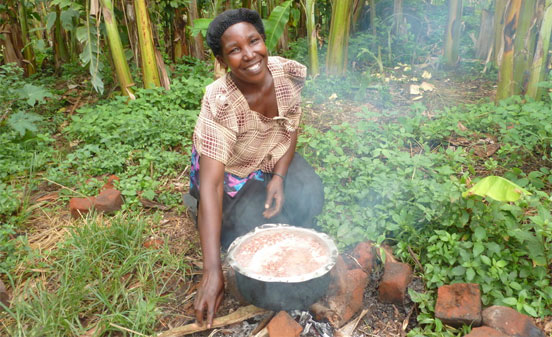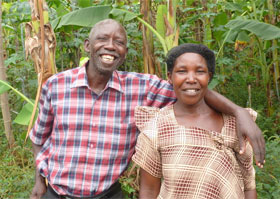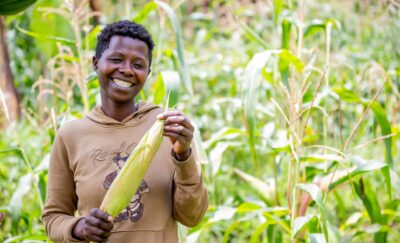News
23 May 2013
“No more worries about food”


Photo: Livingston’s wife Joyce cooking beans from their crop.
A new variety of bean seed is helping farmers in Uganda feed their families – and turn a profit.
Sixty-year-old Livingston lives with his wife, three children and four grandchildren. He planted the crop using good-quality seeds that he and his farmers group grew on their group plot last year.
Unlike traditional varieties, these seeds produce high-yielding plants that are resistant to common pests – and very tasty to boot. They produced such a big harvest that after selling some and using some for the family’s food, Livingston had enough left to plant two acres this season.
He hopes to harvest around 700kg of beans from each acre, for food and to sell. The money will help pay his grandchildren’s school costs – and he plans to buy “a present for the wife”.
Thanks to the new seeds, Livingston said, “My family’s wellbeing has improved. There are no more worries about food. We can earn money, and eat supper and lunch.”
Profitable farming
 Of all the crops he grows, beans are Livingston’s most profitable. He can sell a 100kg sack for 200,000 Ugandan shillings – four times more than he’d get for 100kg of maize, the family’s main crop.
Of all the crops he grows, beans are Livingston’s most profitable. He can sell a 100kg sack for 200,000 Ugandan shillings – four times more than he’d get for 100kg of maize, the family’s main crop.
As demand for these seeds is very high, he also sells some of his harvest for other farmers to use, ensuring that local farmers have an affordable supply of high-quality seeds for the future.
Crop rotation
And unlike maize, the beans take just 60 days to mature, so can be planted up to five times a year.
Livingston said: “Farm Africa helped us with crop rotation – beans do well and maintain soil fertility so it is easier to grow things. We used to grow mixed varieties and the beans didn’t grow well. Now after the training we know the varieties that are suitable for our area.”
Farm Africa is working with 18,000 smallholder farmers in central Uganda. We’re helping them boost their harvests – and end hunger – by training them in up-to-date farming techniques and providing high-quality bean and peanut seeds.
Read more about our bean and peanuts farming
More about our work in Uganda




